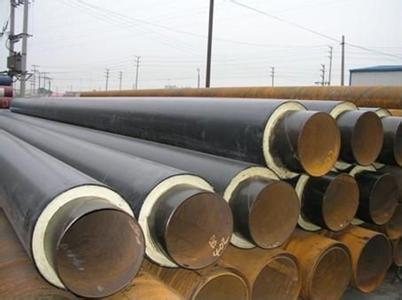用直埋方式的益處顯而易見,但是這種方式對保溫管道提出了更高的請求,主要是其維修和運(yùn)用壽命問題,這關(guān)于保溫管道的防腐尤為苛刻。在聚氨酯保溫層外面的高密度聚乙烯護(hù)套管是其一道維護(hù),大局部塑料在自然環(huán)境下是很難被降解的,特別是高密度聚乙烯在埋于公開后更耐環(huán)境條件下的腐蝕,即便是濕潤、微生物、以在酸堿鹽介質(zhì)下仍比擬穩(wěn)定;另外它的水氣透過率極低,可有效地維護(hù)聚氨酯保溫管。
The benefits of direct burial method are obvious, but this method puts forward higher requirements for thermal insulation pipelines, mainly its maintenance and service life, which is particularly harsh on the anti-corrosion of thermal insulation pipelines. High density polyethylene casing outside polyurethane insulation layer is its first maintenance. Most plastics are difficult to be degraded in natural environment. Especially high density polyethylene is more resistant to corrosion under environmental conditions after being buried in the open. It is relatively stable even in wet, microbial and acid-alkali-salt media. In addition, its water-gas permeability is very low, which can effectively maintain polycondensation. Urethane insulating pipe.
由于封鎖的泡孔構(gòu)造,也使得聚氨酯對工作鋼管的外壁起到一定維護(hù)作用,使之免受來自外部環(huán)境對鋼管外壁的腐蝕。這種復(fù)合保溫管道處理了防腐保溫兩大問題,在公開的運(yùn)用壽命可在20年以上,并且在運(yùn)轉(zhuǎn)年度里不用維護(hù)。當(dāng)然這只是一種理想狀態(tài)下的狀況,在實踐應(yīng)用中也曾呈現(xiàn)諸多問題而形成運(yùn)用壽命降落。其呈現(xiàn)的緣由主要有以下幾方面。
Because of the blocked cell structure, polyurethane also plays a certain role in maintaining the outer wall of the working steel pipe, so that it can avoid the corrosion of the outer wall of the steel pipe from the external environment. This kind of compound insulation pipeline has solved two major problems of anti-corrosion and heat preservation. Its open service life can be more than 20 years, and it is not maintained during the operation year. Of course, this is only an ideal state of the situation, in practice, there have been many problems and the formation of service life decline. The main reasons for its presentation are as follows.
①保溫層偏心,即聚氨酯保溫層與鋼管不同心,構(gòu)成保溫厚薄不均,嚴(yán)重者可使外層塑料軟化而被損壞。

(1) The eccentricity of the insulation layer, i.e. the polyurethane insulation layer is not concentric with the steel pipe, constitutes the uneven thickness of the insulation layer, which can cause the outer plastic to soften and be damaged seriously.
②運(yùn)用不當(dāng)而遭受毀壞,在運(yùn)輸及裝置過程中易受損傷,在埋地后距空中深度不夠或上部土壤及道路較軟,形成載重車輛碾壓后被損壞。
(2) It is easy to be damaged in the process of transportation and installation due to improper use. It is not deep enough in the air after burial or the upper soil and road are soft, which results in the damage of heavy vehicles after rolling.
③接口處置不當(dāng),在管道敷設(shè)裝置過程中,相接二根管焊接不緊密形成滲水,或在“補(bǔ)口”過程中操作不認(rèn)真而形成外部污水滲入保溫層等形成的毀壞。
(3) The improper disposal of the interface, in the process of pipeline laying device, the two jointed pipes are not welded tightly to form water seepage, or in the process of "repairing" the operation is not careful to form external sewage infiltration into the insulation layer and other damage.
④運(yùn)用的塑料和聚氨酯保溫管不合理,如經(jīng)常發(fā)現(xiàn)運(yùn)用分揀雜亂的回收塑料,經(jīng)過擠出成形后的塑料管不能充沛被塑化而致使外管劣化。聚氨酯保溫管密度低形成強(qiáng)度低而在搬運(yùn)過程中就已損壞,另外體系中含有游離酸太高,形成對鋼管外壁的腐蝕等。
(4) The plastic and polyurethane insulating pipes used are unreasonable. For example, it is often found that the recycled plastic pipes with disorderly sorting can not be fully plasticized after extrusion, resulting in deterioration of the outer pipes. Polyurethane insulating pipes have low density, low forming strength and are damaged during handling. In addition, the system contains too much free acid, which results in corrosion to the outer wall of steel pipes.







